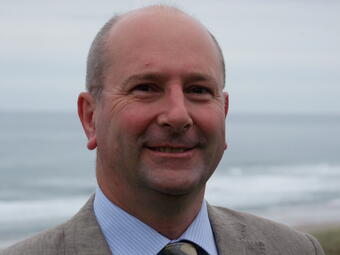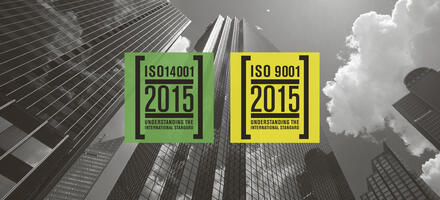
A joint effort for the environment
Progress indicator

Environmental auditing is not a one man, or woman, job. Nigel Leehane, Chair of the ISO sub-committee on Environmental Auditing, speaks to Alicia Dimas about the sub-committee work and how it liaises with the CQI to guide organisations to achieve their environmental goals
The ISO sub-committee for environmental auditing (ISO/TC207/SC2) is a working group that focuses on environmental auditing and related environmental investigations.
Nigel Leehane, Environmental and Sustainability Consultant, chairs this ISO sub-committee, which contributes to the management systems auditing standards that allow organisations to audit their processes for managing environmental performance and check that those mechanisms are working effectively.
“Their auditing will allow them to check, firstly, that they have suitable processes for identifying their environmental risks and opportunities, and can establish appropriate environmental initiatives and performance objectives, and then that they are managing their activities and achieving those levels that they’ve set out to do,” Leehane explains.
The ISO sub-committee for environmental auditing has liaison arrangements with the ISO Quality Management Committee, to ensure that both committees are consistent in the approaches that they adopt. For instance, the Environmental Auditing sub-committee is currently working with the Environmental Management Systems Committee and the International Accreditation Forum to develop simple guidance for environmental auditing, mirroring work already done by the Quality Management Committee.
Leehane says: “We are referring to the guidance that the Quality Committee has already developed with the IAF (International Accreditation Forum), doing exactly the same thing but from a quality perspective. The Quality Committee refers to it as ‘auditing best practice guidance’, so we're looking at what they’ve done and we’re developing comparable and consistent guidance from an environmental perspective.”
Referring to how ISO liaises with quality professionals, Leehane says: “Environmental and quality professionals interact inside and outside the ISO framework. For example, the Institute of Environmental Management and Assessment (IEMA) recently published a study on the future challenges for environmental auditing. That was done for two reasons: firstly, for IEMA’s own benefit to help it reinvigorate its strategy of supporting its members around environmental auditing and secondly to drive vital input to the ISO Environmental Auditing Subcommittee. We liaised with the CQI in the consultation that we carried out for that study (which I authored), so we made sure that we had input from the quality profession.”
Collaboration with the CQI
Although there isn’t a formal mechanism for the sub-committee to collaborate with the CQI, Leehane explains that there is an informal relationship between the two organisations. “People like myself will definitely seek to talk to, consult and liaise with professionals in disciplines such as quality or health and safety. For quality matters we go to the CQI. The organisation relies on the efforts of individuals to maintain these networks and collaborate in that way,” Leehane suggests.
Considering the future of environmental auditing, emerging and recent developments pose new challenges for environmental auditors, he says. “The increasing prominence of integrated auditing with expectations that auditors have skills across multiple disciplines, like health and safety, quality, energy, environment, etc, is posing a challenge for auditor competence.”
Social and ethical performance issues are also becoming more prominent, he adds, as environmental auditors are being asked to become more involved with these issues. “Also, there’s a need or a growing expectation that auditors can operate at a more strategic level. Certainly, the emphasis in the 2015 versions of ISO 14001 and ISO 9001 have that more strategic slant to them regarding environment and quality, so auditors need to have business and strategic skills to be able to address that. They are also expected to audit senior management, which is a new requirement for both of those standards. So again, that’s something that can be a challenge.”
Leehane says that besides changes to standards, increasing reliance on new technologies can also be a challenge to auditors. “Expectations around auditing electronic databases, which may be new for some auditors, and using technology to audit people via video conference and other forms of communications, are examples of how the auditing landscape is changing.”
However, he says that it is still crucial that auditors retain and develop their traditional skills, like good judgement and communication skills, for instance. “It is very important to be able to communicate with senior management and demonstrate the value that auditing can bring. Auditing it’s not just the box-ticking, form-filling exercise, but it’s actually helping the organisation understand its performance and potentially also opening up new opportunities for the organisation to improve.”
About Nigel Leehane
Nigel Leehane has over 25 years’ experience in environmental management consultancy, focusing on improving environmental and sustainability performance in organisations. This involves strategy development, environmental and integrated management systems, corporate responsibility, carbon accounting and climate change mitigation.
He has extensive experience on environmental management in the industrial infrastructure sectors, including manufacturing, oil and gas, chemicals, food and drink, mining, construction and transport.
Leehane has represented the UK on various ISO working groups for a number of years, including on ISO 14001:2015 for environmental management systems, ISO 19011:2018 for the auditing of management systems and ISO 45001:2018, the OHS (Occupational health and safety) management systems standard. He is currently participating in the development of ISO 14016 for the assurance of environmental sustainability reports.
As well as the ISO sub-committee for environmental auditing (TC207/SC2), he is also chair of the BSI sub-committee SES/1/2 for Environmental Management – Environmental performance evaluation, environmental auditing, reporting, environmental labelling and related environmental investigations. He is an expert in EHS (environment, health and safety) management systems, environmental auditing, corporate responsibility and sustainability, compliance, GHG (greenhouse gas) accounting and reporting, and environmental training.

Quality World

Get the latest news, interviews and features on quality in our industry leading magazine.
ISO 19011:2018
Find out more about the CQI's latest report ISO 19011:2018 - Understanding the International Standard.



